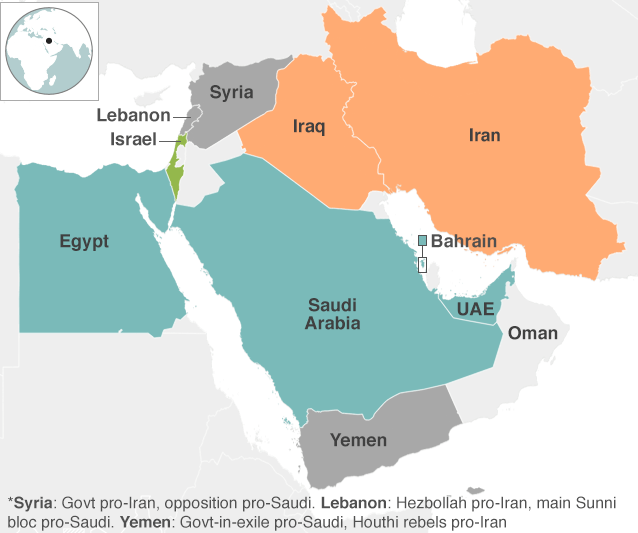International Relations
Normalizing Saudi-Iran Relations
- 18 Oct 2021
- 5 min read
Why in News
Recently, four meetings took place between representatives of Iran and Saudi Arabia in Baghdad, and one in New York. These meetings indicate continuity in the warming of bilateral relations that had been frozen since 2016.
- The renewed bilateral ties and normalization of relations between Saudi Arabia and Iran will pave the way for regional stability and diplomatic ease for India as well.
Key Points
- Background (Saudi Arabia-Iran Conflict):
- Religious Factionalism: The decades-old feud between them is exacerbated by religious differences.
- They each follow one of the two main branches of Islam. Iran is largely Shia Muslim, while Saudi Arabia sees itself as the leading Sunni Muslim power.
- Historically, Saudi Arabia, a monarchy and home to the birthplace of Islam, saw itself as the leader of the Muslim world.
- However this was challenged in 1979 by the Islamic revolution in Iran which created a new type of state in the region - a kind of revolutionary theocracy - that had an explicit goal of exporting this model beyond its own borders.
- Regional Cold War: Saudi Arabia and Iran - two powerful neighbours - are locked in a fierce struggle for regional dominance.
- Uprisings across the Arab world (after the Arab Spring in 2011) caused political instability throughout the region.
- Iran and Saudi Arabia exploited these upheavals to expand their influence, notably in Syria, Bahrain and Yemen, further heightening mutual suspicions.
- Moreover, external powers like the US and Israel have a major role in exacerbating conflict between Saudi Arabia and Iran.
- Proxy Wars: Iran and Saudi Arabia are not directly fighting but they are engaged in a variety of proxy wars (conflicts where they support rival sides and militias) around the region.
- For Example, Houthi rebels in Yemen. These groups can acquire greater capabilities which can cause further instability in the region. Saudi Arabia accuses Iran of supporting them.
- 2016 Flash Point: Many Iranian protesters attacked Saudi diplomatic missions in the Iran following Saudi Arabia’s execution of the Shiite Muslim cleric Sheikh Nimr al-Nimr.
- Religious Factionalism: The decades-old feud between them is exacerbated by religious differences.
- Reasons for Normalization of Relations:
- Saudi Arabia Vision 2030 Strategy: This refers to targeted reforms within the country’s economy, defense, tourism and renewable energy.
- In the context of Covid-19, Saudi Arabia has realised that to attract serious investment, it can only achieve that through a de-escalation with Iran.
- Compromise on Regional Front: Saudi Arabia is also involved in the process of establishing Syria’s power holder Bashar Assad in the Arab League (a regional organization)- a move that has been welcomed by Iran.
- Withdrawal of US from the Region: The arrival of the new US president (Joe Biden) administration and withdrawal of US from Afghanistan and now focusing more on the Indo-pacific region, could be another reason for softening of Saudi-Arabia’s stance on Iran.
- Saudi Arabia Vision 2030 Strategy: This refers to targeted reforms within the country’s economy, defense, tourism and renewable energy.
- Possible Impact of Normalization of Relations:
- Resolution of Israel-Palestine Conflict: Warming of relations betwen Iran and Saudi Arabia may have a postive impact in dealing with Israel and the Palestinian issue.
- Stabilization of Oil Market: Iran and Saudi Arabia share a common interest for stable oil prices given the importance of the market to their economies.
- Normalization of relations would ensure steady oil revenues for all producing countries and more predictability to economic planners in both Saudi Arabia and Iran.
Way Forward
- Role of India: Historically, India has good diplomatic relations with both the countries. Stabilization of relations between the two countries may impact India in a mixed way.
- On the negative side, higher oil prices will affect the balance of trade in India.
- On the positive side, this could provide easing of investments, connectivity projects across the region.
- Reciprocity by Iran: Iran still needs to make a mark in its diplomatic efforts by publicly supporting a cease-fire in Yemen.
- Easing of US Sanctions: Clarity on US sanctions over Iran is of prime importance, if Iran-Saudi Arabia relations are to get normalised.







